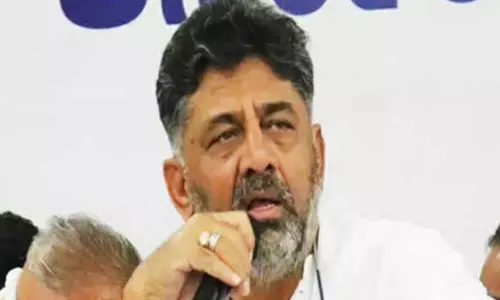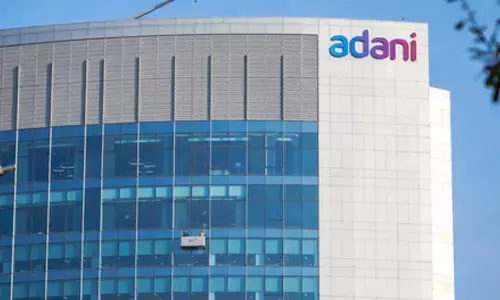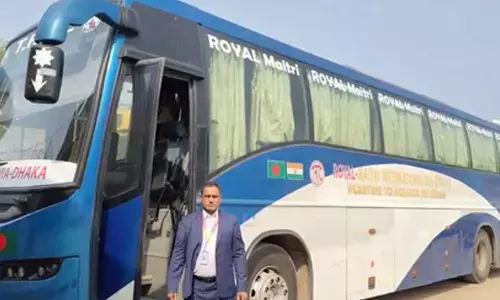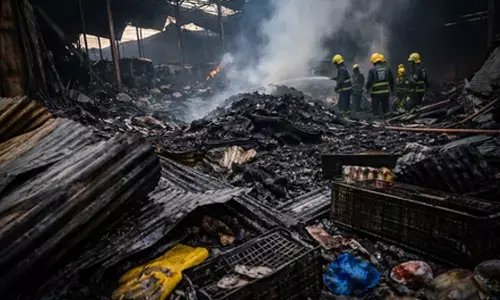Flawed reforms and falling economy
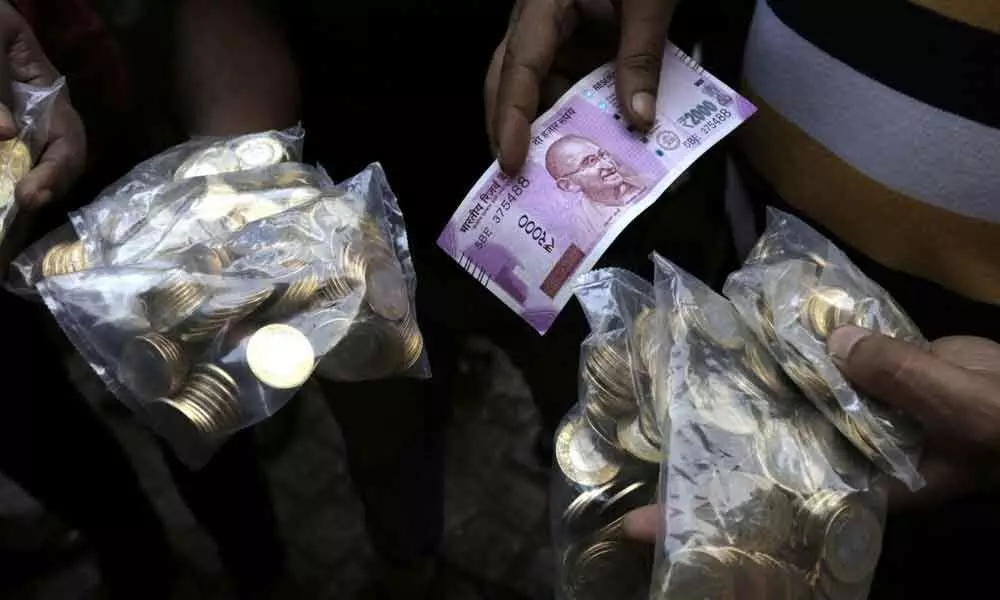
Following the recent elections to Parliament and the State legislatures in Andhra Pradesh and Telangana States, winds of change have certainly started blowing.
The initial sound and fury, that invariably follow the formation of new governments, having now more or less settled down, this might be a good time to take a look at how the economy of the country is shaping up and what the financial situation in the two States looks like.
A recent report has it that something like one lakh crore rupees would be needed to fulfil the electoral promises made by the Chief Minister of Andhra Pradesh. For a State just recovering from the pangs of division of the erstwhile composite Andhra Pradesh, and the consequent loss of Hyderabad – a major blow indeed to its prospects of prosperity and growth - this would indeed be a tall ask.
And the slew of rash and hurried announcements, made by the previous regime, in the run-up to the previous elections, did not help much either. One would, therefore, expect a great deal of restraint, sobriety and austerity to inform the general attitude of the government towards the management of its finances.
Quite to the contrary, however, the present dispensation is also not lagging behind in handing out doles and carrying out largely unproductive activities in the name of fulfilling electoral promises.
When all is said and done, however, one need not be unduly pessimistic, as the Chief Minister is known to possess a record of being a successful entrepreneur and, given the State's bountiful natural resources, finding the money cannot be a problem.
Only, the programmes taken up by the government need to be sound, economically viable and environmentally sustainable. Jagan Mohan Reddy also has the tremendous advantage of having a substantial following in the Indian diaspora abroad and should be able to tap their assistance fruitfully.
And, thanks to his recent historic "padayatra" preceding the elections, he has a thorough and deep understanding of the issues rural Andhra Pradesh is facing. The State government's recent remarkable attempt to substitute the erstwhile hypocritical delegation of authority with genuine decentralisation also promises to usher in genuine democracy and, in the long run, can serve to rein in financial indiscipline.
And, if the reported attempts being made to prune the number of programmes and rationalise development initiatives succeed, one can see good days ahead for the State.
This columnist remembers vividly the day there was a muted celebration in the corridors of (the then) Andhra Pradesh Secretariat when the State's plan outlay crossed the hundred crore mark for the first time.
In the days when an outlay of hundred crore rupees represented what is known as a "token provision" that was, indeed, an important milestone to have crossed. It is a reflection of the inflation that has taken place in between, and the consequent dilution of the value of money, that that year's total outlay today, sadly, probably represents a similar token number.
This allusion to numbers is really in order to highlight the significance of the fact that the budget presented by Chief Minister K Chandrashekar Rao for the year 2019–20 for the State of Telangana was for 1,46,492.30 crores!
It is significant that the Chief Minister, on that occasion, for the first time in his close to six-year tenure, admitted to the State facing a financial crisis. That he attributed the situation to the overall "slowdown" in evidence the world over, and in the country as a whole, is not a mitigating circumstance at all.
Nor is the justification offered that the fall in the value of the rupee, against the dollar in particular, is another cause for the crisis in the State. The solace attempted to be drawn from the fact that, despite all its failings, the management of the State's economy has been much better than other States like, for instance, Punjab or Karnataka.
Such comparisons and rationalisations would be in order if the handling of the finances of the State by the government in the recent years was marked by prudence and caution.
Generous doles, largely unproductive, impulsive gifts in response to moments of elation (even the High Court commented about the "gift" to the people of a constituency after the ruling party won the by-election there recently), expensive celebrations of festivals, waivers of loans due for payment-in violation of norms prescribed by sound economics as well as the country's Central bank - the list goes on endlessly.
And the most distressing part is that the unfortunate example set by the State has caused cascading reckless competition, not only in other States but in the government of India, to substitute doles for investments, especially in an investment – starved sector such as agriculture.
And now the disbursements under the Rythu Bandhu programme are being put on hold to find money to pay salaries to the government staff! Little solace can be drawn, on the other hand, from the health of the national economy or the manner in which the country's finances are being handled by the government of India.
The Washington Post carried a report recently commenting on the sharp deceleration (in fact a six-year low) in the economic growth of the country in the quarter ending 30 June 2019. The GDP also expanded by a mere 5% in that quarter as compared to 7 percent and above in the recent years.
The report noted that, following a decrease in consumer spend and a fall in demand for exports, the country's economy, which, until this year, was considered the world's fastest–growing economy, is showing signs of a worrisome downward trend. in another report, Dharmakirti Joshi, Chief Economist at Crisil, noted with concern that activity in the manufacturing sector of the country was weakening and private consumption, (which he described as "the bulwark of the Indian economy"), was slowing down.
In In this context it is pertinent to recall that Abhijit Banerjee, this year's Economics Nobel prize winner, observed that a reduction in the tax on middle class incomes would leave more money with them and trigger consumption – a measure far better than a cut in corporate taxes.
The Hindu recently carried another report that the output of eight core infrastructure industries contracted in the month of September this year indicating the severity of the economic slowdown.
The report also stated that, during the April – September period, the growth of core industries slowed to 1.3% as against 5.5% in the year – earlier period. It need hardly be stressed that, if the country is to move in the direction of containing, if not eliminating, poverty, and addressing effectively the challenge of unemployment (which jumped to a 45 – year high in 2018), the economy needs to expand at a much higher rate for a sustained period of time in the near future.
One must confess to entertaining serious doubts, in this situation, of Modi's dream of a 5 trillion economy by 2024 for the country, materialising. No doubt a worldwide economic slowdown is in evidence.
Rising trade and geopolitical tensions have created doubts about the stability of global trading systems and international cooperation in the future, with the inevitable result that business conference has taken a beating. Experts have actually commented that the world economic outlook looks precarious.
Consoling oneself with the thought that the situation in the country is, when all is said and done, a mere reflection of a worldwide phenomenon would, however, hardly constitute a solution to the problem.
Robust and determined efforts are required to increase foreign demand, trigger consumption, incentivise private investment, and deal firmly with the liquidity crisis in the banking sector.
As this columnist has had occasion to observe in the past, this is as good a time as any other to sit back and look at the big picture. Sustainable growth, robust development and a stable and healthy economy, will all be possible when the political leadership, and the experts and senior civil servants who advise them, get down seriously to the task of ordering the priorities and options available to the nation.
Many things are worth doing and need to be done too. From the promotion of the fine arts and encouraging adventures such as mountain climbing or river rafting, to mounting expeditions to the Antarctic or the moon, and supporting Centres of Excellence such as the IITs and IIMs - there is a vast canvas of activities that can engage the nation's attention.
The question is whether they cannot wait until issues, such as health care, school education, prevention of honour killings of women, trade in children and the distress in the agriculture sector leading to suicides by farmers, have been satisfactorily addressed.
(To be continued)
(The writer is former Chief Secretary, Government of Andhra Pradesh)



